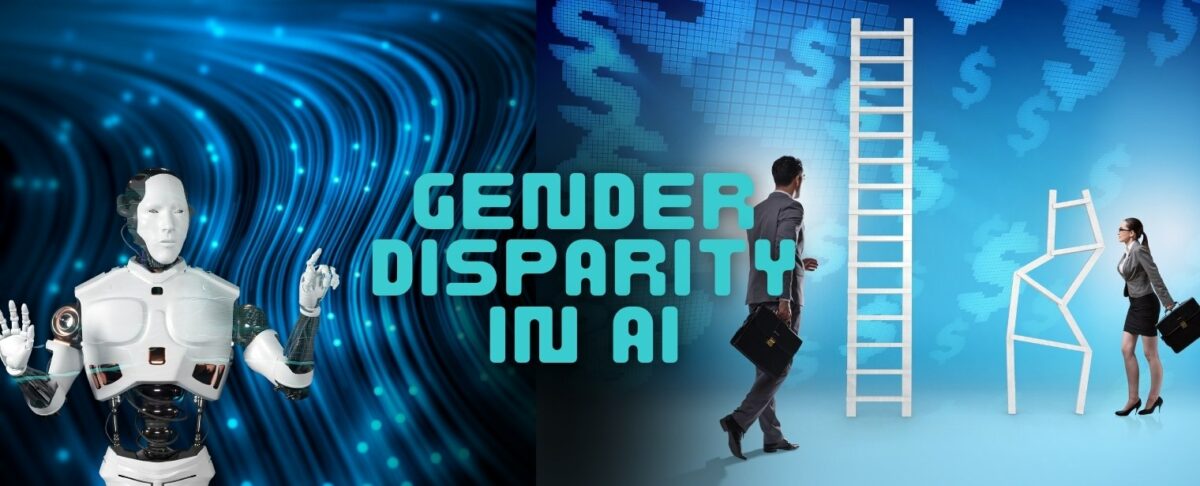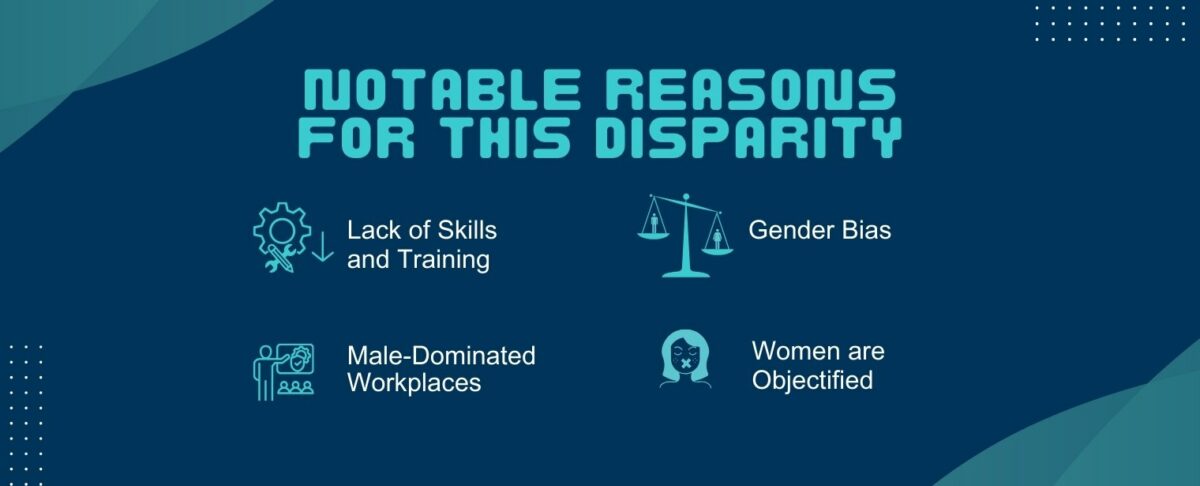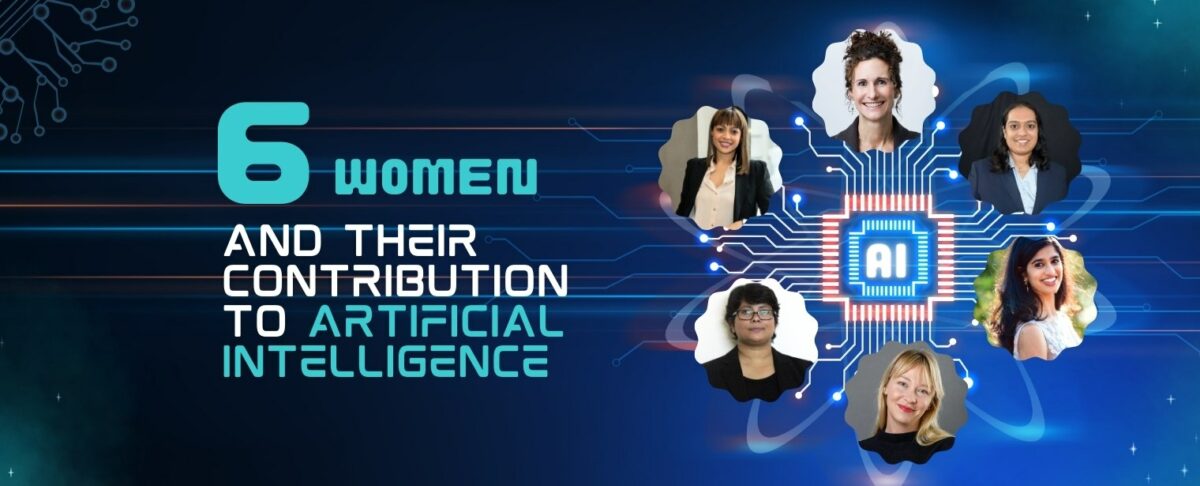Women in AI: Prominent women in AI

Women in our country have showcased exquisite performances in many areas such as aeronautics, healthcare, academics, research and many more. So, why would they lag behind when it comes to technology?
Though females only comprise 12% of AI researchers globally, women in India are not leaving a single stone unturned to use AI in their favor and contribute significantly to the sector wherein they are operating.
To say in a nutshell, the boom of Artificial Intelligence will reshape the various sectors that we come across in our daily lives from healthcare, education, finance to governmental functions. But, unless women come to the forefront and optimise this technology effectively, the immense significance and poise that AI holds in society will come to a sudden standstill.
In today’s blog, we will explore some of the notable myths and misconceptions that global women, plus women in India are consistently debunking and how they will continue to do so in the next couple of years.
Let’s begin!
Gender Disparity in AI

International Women’s Day was first celebrated way back in 1911, but still, women are not entitled to certain rights and several studies and findings have made that thing as clear as a bell.
Interestingly, when Alan Turing conceptualized Artificial Intelligence in 1956 as part of the Computing-Tabulating-Recording-Company would think that women would leverage this technology to the full and redefine a plethora of sectors all across the globe at a whole new level.
Yes, women’s empowerment has progressed drastically in the last few decades. Whether it’s massive datasets, breakthrough developments in AI and machine learning or powerful computing tools and technologies, the advancements that the digital world has witnessed recently, giving women a chance to showcase their skills and expertise when it comes to AI utilization has become more important than ever.
Gone are the days when gender disparities would prevent women from operating in prominent sectors of our society and technology is no exception.
While women only account for 25% of the total global AI specialists, a hell lot of countries and organizations worldwide are encouraging the active participation of women in AI and its real-time applications simply to bridge the gap of gender inequality and incorporate more women empowerment when it comes to technology optimization.
Particularly, the year 2022 has marked the beginning of AI applications and how women are using them to reshape industries and sectors that are paving the way for millions with new prospects and opportunities.
With the revolutionary generative AI already on the table, creating real-time images and videos, content generation, and cutting-edge chatbots collaborating, almost everything is possible nowadays by making proper and on-time use of this technology.
For example, ChatGPT has garnered 10 million active users in a very short time which has made it the most rapidly-developing-consumer-applications in global history. Now the question is with women already showing amazing performances in fields such as education, politics, healthcare, philanthropy etc., will they ever get to play a striking role in technology, more so, when the world is looking up to AI in transforming their operational efficiency, improving expertise and upgrading knowledge?
The answer is yes, and women had to face a lot of obstacles and challenges before they could attain this position. Hopefully, the next few years will see a cumulative rise in AI utilization by women and the transition of various landscapes and dimensions as a result of that.
Notable Reasons for this Disparity

In the last few years, technologies have evolved in leaps and bounds and there is no second thought to it. Despite this significant progress, gender inequality and lack of economic empowerment amongst females are preventing women from gaining a foothold in the field of AI optimization.
Aside from that, there are many reasons that have contributed to this regress in Indian women and women in general all over the world. Let’s find them out below.
Lack of Skills and Training
A lack of proper skills and training for women is still prevailing in many countries teamed up with poor digital infrastructure.
Particularly, in India the condition is even worse with little to no access for the nation’s women to AI Research and Development (R&D) more so with increasing male-dominated landscapes where men seem to impose more power in AI functions and operations than women.
Gender Bias
Gender biases and discrimination have been inculcated in almost every area of our lives and even in the modern era, women are having to pay for it.
With deleterious stereotypes and favoritisms entwined in AI algorithms, women are getting the least opportunities when it comes to displaying their true potential in using the technology.
Plus, according to statistics, only 15% of women comprise the total AI staff of Facebook while for Google, it’s only 10% and AI specialists and researchers must shed light on this predicament while making the use of Artificial Intelligence more female-centric.
Male-Dominated Workplaces
In most growing AI companies, men are enjoying a greater deal of importance as compared to women.
As per a Deloitte Survey on Women in AI, it was noticed that discrimination and judgmental attitudes from male colleagues are common practices in many AI-powered sectors, preventing women from getting along well with their fellow peers and, consequently, not being able to showcase their skills and expertise when it comes to AI optimization.
Further, in many organizations, men are getting more priority as AI experts and leaders while women are restricted to the roles of background voice artists for most of the humanlike chatbots and Virtual Personal Assistants (VPAs).
Moreover, a lot of female undergraduates from reputed colleges and universities could not intern in machine learning and AI, chiefly due to the one-sided importance that their male batchmates were getting. The plight doesn’t end here and 73% of women have left the tech industry because of unequal pay scales and a lack of prospective career options.
Similarly, 58% of global women have left at least one employer in their lives due to the male-centric work environments they came across in their respective AI sectors.
While this disparity reflects the discrimination women are constantly having to face at their professional end, more attention is required to address and resolve such underestimations, getting female aspirants and learners better scopes and opportunities in the field of AI and machine learning.
Women are Objectified
As a technology, AI can create images and visual objects that seem no way less than real-life graphics. Particularly, cutting-edge generative AI tools can create such visual images in a snap of a finger.
Consequently, many companies are taking undue advantage of this facility, depicting women as sexually appealing objects and avatars while for men the image is displayed as more career-centric and self-assured individuals when it comes to AI-powered advances and breakthroughs.
Luckily, we have a plethora of AI-integrated generative tools on the table that focus more light on women’s socioeconomic power and equality and with so many avant-garde AI machines already prevailing in the market, day by day we are getting closer to what we call ‘’the era of female-dominated Artificial Intelligence.
6 Women and their Contribution to Artificial Intelligence

Women have the instinctive potential to bring ground-breaking changes possibly in any sector out there. Though as little as 22% but women worldwide have already showcased the finest of their skills and expertise when it came to operating as AI specialists in various sectors and domains.
Here are only 6 of such female gurus who have not only busted the myth that ‘’STEM careers are only meant for men’’ but have also made notable achievements in Artificial Intelligence while gaining a substantial foothold in their respective industries.
Priyanka Roy
Priyanka chiefly specializes in the area of data and AI solutions and has an instinctive fondness for resolving business issues by effectively using Artificial Intelligence. Her vast experience of 15 years, operating as an international AI expert in countries like the USA, Germany and India has led legions of companies and organizations to make informed decisions and improve their bottom lines by leveraging the core business intelligence and analytics and the potential aspects related to it.
Further, Miss Roy has also enabled budding startups and enterprises to formulate custom AI products and solutions catered to their clients’ unique requirements.
Caitlin Smallwood
As the Vice President of the Data and Insights sector at Netflix, Caitlin Smallwood’s primary job is to lead and implement several data science operations within the company. This constant focus on tech-driven developments and executions has what made Netflix the most in-demand OTT platform with more than 50 million subscribers all over the globe.
By optimizing various AI-powered recommendation systems and analytics for numerous real-life application cases, she has displayed the finest of her skills and expertise when it came to leveraging the most of Artificial Intelligence.
Examples include customizing recommendations, conducting customer research and statistical analysis, executing data engineering operations and so on, notable breakthroughs that have already taken Netflix to new heights of success.
Lakshya Sivaramakrishnan
Lakshya Sivaramakrishnan is the technical program manager at Google. In India, she is known to manage the ‘’Women Techmakers Program’’ and is very passionate about building tech-driven data science products and solutions in Google Cloud and Machine Learning.
On top of everything, she encourages other women as well to join the field of Artificial Intelligence, leading them to gain a thriving position and substantial foothold in the industry.
Ujjayani Mitra
Ujjayani Mitra is the founder and CEO of TheDeltacube.ai and she also operates alongside as the strategic advisor at Zupervise. She believes in optimizing a cluster of AI, innovation and design thinking, striving to build the dinkiest of products and solutions for businesses from the lousiest of tools and resources.
With a vast professional experience across industries such as telecommunication, e-commerce, digital media and entertainment, she is constantly focusing on creating a data and AI-enabled culture for the various large enterprises out there.
Tulsee Doshi
Tulsee Doshi, a prominent name in Google is the product lead of the company, contributing significantly to the organization’s Responsible AI and ML Fairness sectors. Her focus is on building highly intuitive, scalable and comfortable user experiences that businesses can benefit from, making B2B and B2C interactions more accessible and insightful.
Further, she believes in utilizing different machine learning and AI-oriented technologies to create even better and swifter recommendations that work for companies and people coming from various walks of life.
Particularly, when it comes to machine learning products and solutions, she has garnered a massive experience in this sphere by optimizing AI-enabled tools and components to the best of her ability.
Aleksandra Przegalinska
As a senior research associate at Harvard University and vice-rector and associate professor at Kozminski University, Aleksandra Przegalinska holds a PhD degree in artificial intelligence and is constantly up to creating new trends and advances related to the technology. Currently, her area of specialization is wearable tech as she incessantly strives to build a sustainable culture for Artificial Intelligence and Machine Learning.
Conclusion
As Artificial Intelligence develops at a rapid pace, the importance of women in transforming the technology is also increasing along with that. When given the power and authority, women can bring path-breaking evolutions in AI and machine learning with a plethora of sectors and industries benefitting from them.
So, if the 6 potential ladies stated above can leverage AI to transition their respective sectors, you too can do the same by choosing a prospective career option in Artificial Intelligence and relevant spheres, subsequently, building a workplace environment that is AI-centric from start to finish.
Good Luck!
Frequently Asked Questions
What is the role of women in Artificial Intelligence?
Despite Artificial Intelligence being a male-dominated industry, women are notably contributing to the development of the technology and the various real-life applications related. For example, Elaine Rich a reputed American computer scientist played a key role in coining and developing the concept of Natural Language Processing (NLP) and expert systems.
How many women work in Artificial Intelligence?
Currently, only 22% of total global women are experts in Artificial Intelligence, gaining a substantial foothold in the fields of AI and machine learning as compared to their competitors. Nevertheless, more potential females are yet to play a notable role in bringing revolutionary changes in Artificial Intelligence and similar sectors.
Who is called the father of AI?
John McCarthy, a revered American Computer Scientist is regarded as the inventor of AI and the term ‘’Artificial Intelligence’’ was first coined by him.

